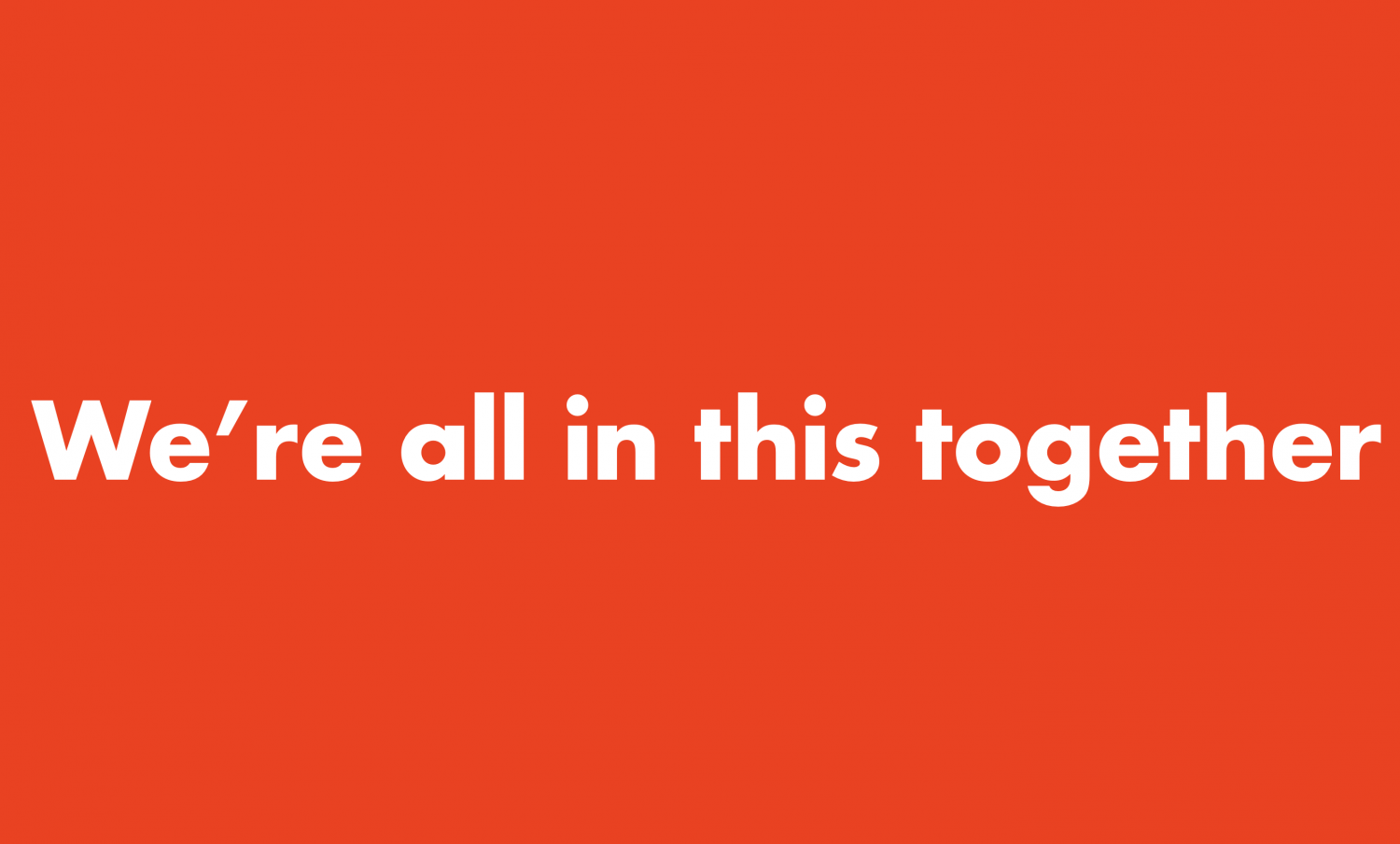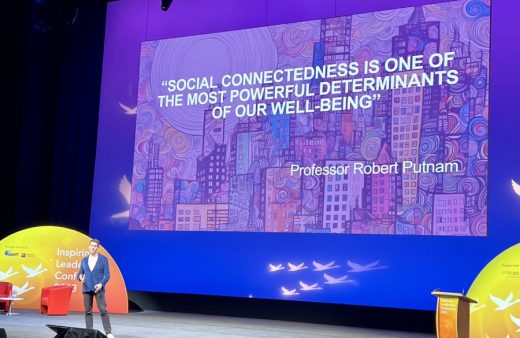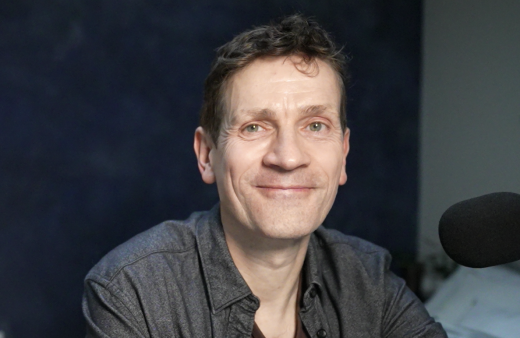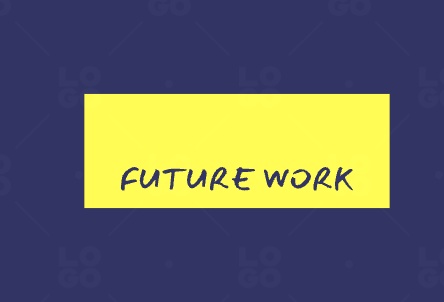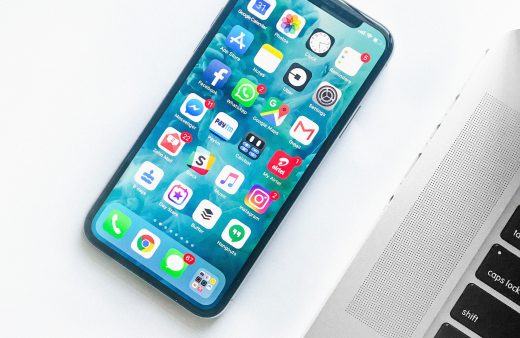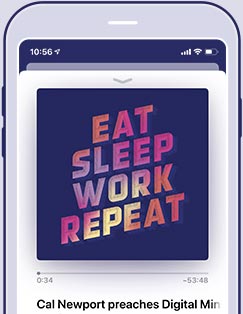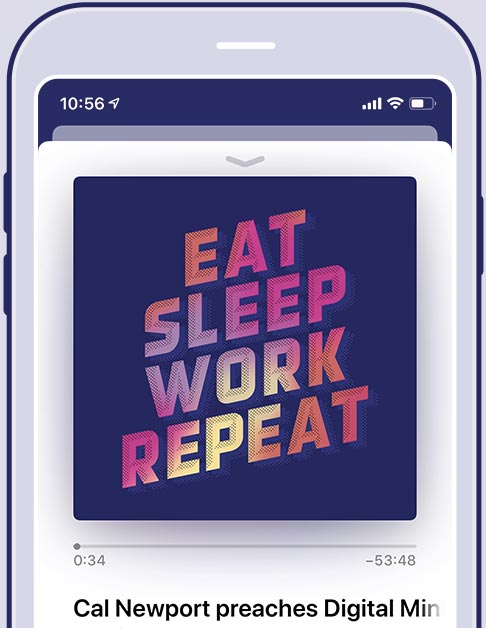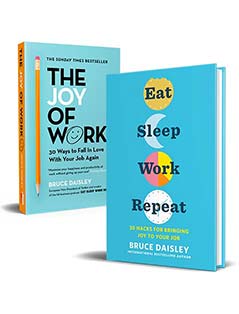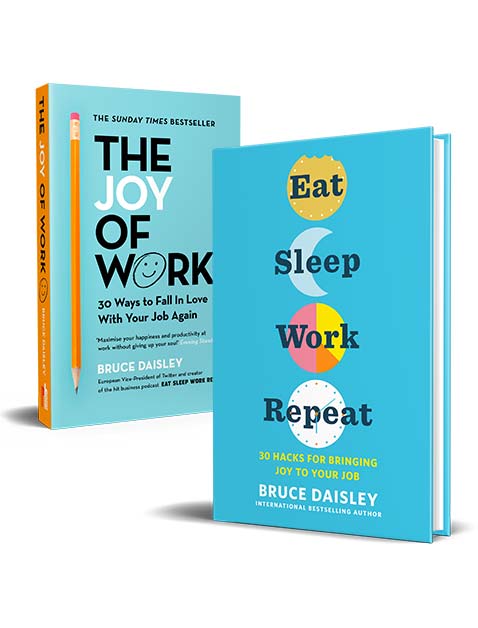My presentation to the Economist conference March 2022
If you saw my Economist presentation then this page will give you access to some of the data I used – or remind you or some of my main points.
I’m here to talk about how the biggest impact of the pandemic is going to be to rip apart companies with disfunctional cultures. It’s going to happen in a way that is familiar to us from the way our politics has changed. Sound like fun?
Firstly worth having a discussion about culture. he question what is culture. There’s been an immense focus on the tactical mechanics of hybrid work – of how many days and what teams are doing – and as a consequence we’ve missed what culture is.
Let me kick off with a couple of definitions. This is by Ben Horowitz – a VC in silicon valley. I quote it because he’s actually done some of the best work updating what we mean by culture. Here’s more on Horowitz’ book What You Do Is Who You Are.
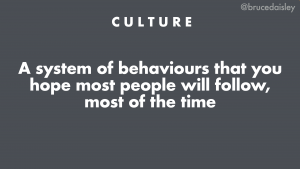
The world’s leading workplace culture doctor is Frances Frei. She’s gone into organisations like wework and uber to help fix them. (More on Frances, including a podcast discussion with her).
She’s taken the work of the pioneering psychologist Edgar Schein here. In the 1980s Schein wrote a lot about workplace culture but he is violently unquotable. Frei had a conversation with me when she paraphrased his work that explained the essence of culture
I want to add another contribution – and it’s one that I think will justify itself by the end of the presentation. Good workplace culture is a sense that we’re all in this together.
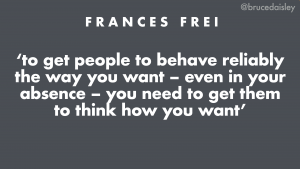
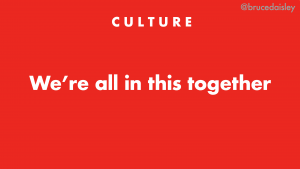
What does that look like? There was some good work done in Italy looking at these things.
It asked a series of questions. Here’s a couple of them.
- When I talk about my team I say we rather than they
- Our leader is a good example of the kind of people who are members of my team
What the researchers found was fascinating. The more that respondents answered these questions referring to sense of we the less stressed they were by their jobs and the greater the sense of job satisfaction they felt.
None of this should surprise is. I was chatting to someone who works for the UN with their projects in the developing world. He said the first thing that UN seeks to do is assess and build social cohesion. A functioning society is one that is tightly bond – that feels bonded.
Our assessment of work has become very tactical – and we’ve missed the system thinking.
Not only are groups more effective when this is the case but it extends – as the UN show to society.There was some wonderful work done by Alex Haslam who is iconic in this space and Nik Steffens. They work in Australia and they looked at the politicians who used we/us. Those who used those phrases more were elected 80% of the time.
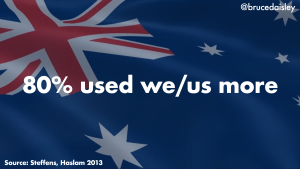
Once you recognise the power of us, the power of we you see it everywhere.
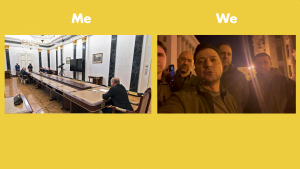
Critical for the moment we are in then there is the question of how do you create that sense that we’re all in this together. And I want to articulate what might be currently destroying it.
If I was going to recommend one book about workplace culture – and again you’ll find this on that sources page at the end – is the Good Jobs Strategy by Zeynep Ton. She gives an interesting perspective of how giving good culture to workers isn’t just a random decision its a strategy that achieves profitability and growth
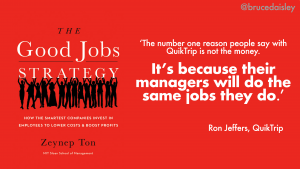
Here’s a quotation from the book:
“At Trader Joe’s, for example, all managers spend part of their workday unloading boxes, helping customers, and being cashiers. So do the managers at QuikTrip. Ron Jeffers, QuikTrip’s vice president of operation systems told me, ‘The number one reason why people stay with QuikTrip is not the money. It’s because their managers will do the same jobs they do. They have never worked anywhere else where the management will do the worst parts of the job such as clean the bathroom, empty the trash, work in the freezers, and clean the gas islands’. Experiences like this do several things. They give employees a much stronger sense of being part of the team that accomplishes the company’s purpose. They also allow employees to identify much more strongly with the top managers, who clearly do make a difference. And they endow the employees’ work with more significance; if it’s important enough for higher-level people to pitch in to make sure it gets done, then it must be pretty important.”
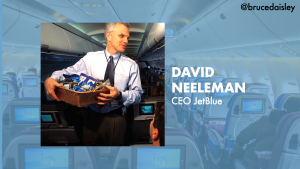
This is david Neeleman – former CEO of Jet Blue local airline carrier in the US. Neeleman was famous for crewing a flight once a month in the US. Very effectively communicates a simple message – we’re all in this together. It’s not about me, it’s about we. I’ll explain in a moment why this is going to be a bigger concern going forwards.
Here’s someone who understands. When Jurgen Klopp took over at his former club Borussia Dortmund he had a chat with some of the backroom staff and resolved that there was an absence in team feeling. He told the coach that they needed to move from me to we.
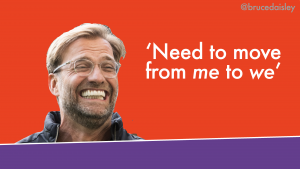
Whether Jurgen Klopp does this consciously or unconsciously he is a master of it.
You might remember at the start of covid when football got suspended. Liverpool were a lock to win the league for the first time in 27 years.
Klopp released a statement. It was magnanimous
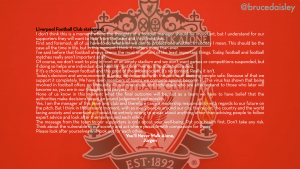
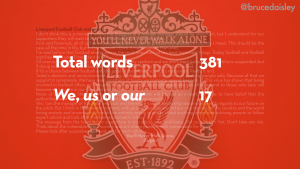
In a brief statement he used we, us or our 17 times.
If Klopp was adding his pronouns to his social media profiles I have no doubt that he’d be using we/us
Look what we’re talking about here are themes of identity. As soon as identity is discussed it is evoked in two ways – it is either scorned for the reason why things are wrong in society or it is described as the advent of some woke brigade who have ruined society.
Beware – both of those are distractions. Feeling part of us has a long history. Thatcher sold my parents their council house because she knew that home owners voted Tory. That’s identity. Tony Blair led a revolution in higher education because educated people don’t vote Tory. And of course if you want to see the master of identity then look no further. Here’s Winston Churchill’s Fight Them On The Beaches broadcast.
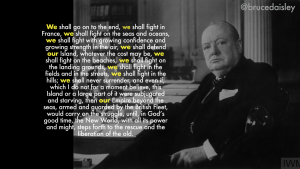
“We shall go on to the end, we shall fight in France, we shall fight on the seas and oceans, we shall fight with growing confidence and growing strength in the air, we shall defend our Island, whatever the cost may be, we shall fight on the beaches, we shall fight on the landing grounds, we shall fight in the fields and in the streets, we shall fight in the hills; we shall never surrender, and even if, which I do not for a moment believe, this Island or a large part of it were subjugated and starving, then our Empire beyond the seas, armed and guarded by the British Fleet, would carry on the struggle, until, in God’s good time, the New World, with all its power and might, steps forth to the rescue and the liberation of the old”
But now I want to move to the moment that we are in.
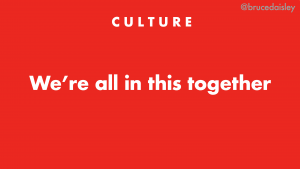
Let’s think about the office. Using the inspiration of Clayden Christianson we need to think about the ‘jobs to be done’ by having an office.
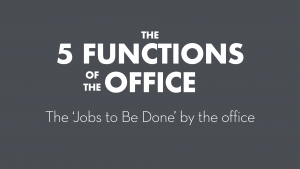
Let’s be explicit about them:
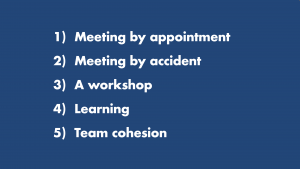
More about meeting people by accident in the talk by Alex Pentland halfway down this post.
The latest research by Leesman gives us a perspective on how the fondness for the office is playing out. This is what workers thought about working in the office. (All of the data is here)
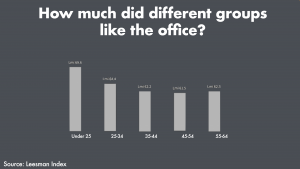
And here’s the critical thing, in terms of getting the job done EVERY group prefers being at home.
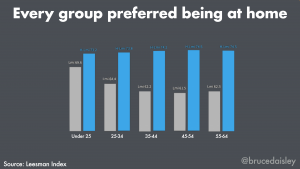
It’s worth drilling some more into the satisfaction with homeworking.
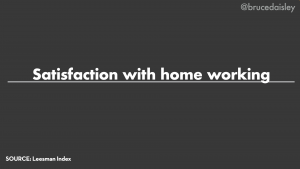
Those who worked on a shared table in the office much preferred being at home than those who had a private office.
Simultaneously those who are working on a dining table or sofa are much less happy being at home than those who have a dedicated home office.
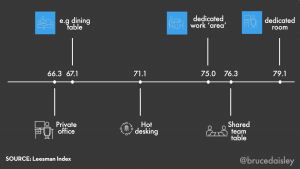
Overall there was one single group who preferred being in the office.
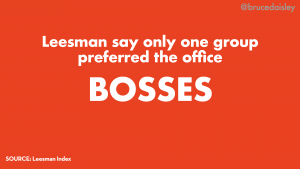
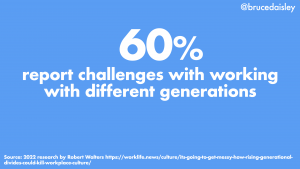
60% of workers are reporting challenges of working with people from different generations. Here’s an example of this. 55% of Millennials want more flexibility and more remote working. Meanwhile…
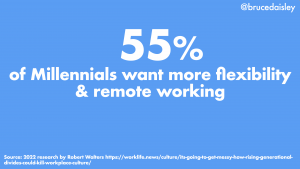
Over a third of other generations think Millennials moan too much.
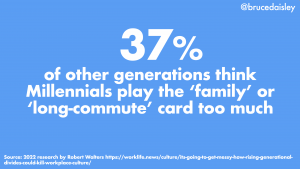
There’s even more to this. We’re starting to see other fissures between leaders and workers. The CEO of Google is leading a company that illustrates this. Do you know the leadership paygap at your organisation? At Google the CEO earns over 1000 times the average salary. Or you might have seen the article last week that Facebook execs have chosen to work from Hawaii or New Zealand to enjoy the benefits of remote working.

Ok, we could start getting a generational schism. One group with their own home, a home office, sorry to mention it but they might have voted Brexit, and they’re never in the office. Versus another group.
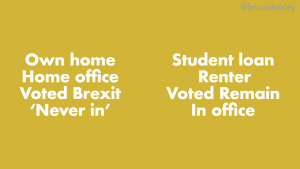
Do you wonder why Mrs Browns Boys is always the top rated comedy show every Christmas but you’ve never met someone who watched it. Well there’s something in that, but people who watch the show are 62% likely to have voted Brexit. They watch it, they love it, and they probably wouldn’t like you either.

Pre-pandemic there were signs of this generational split. The slur of OK Boomer gained some traction but when we’re around each other every day there was some smoothing of this. Noreena Hertz talks about the power of micro-interactions to bond us.

Here’s why this matters – here’s a quotation from Edgar Aldsworth Ross, the father of American sociology. I’ll skip to the end bit though, ‘A society, therefore, which is riven by a dozen oppositions along lines running in every direction, may actually be in less danger of being torn with violence or falling to pieces than one split along just one line’.
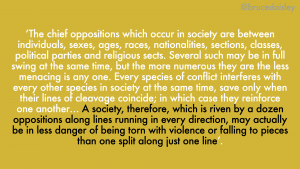
I’ll leave you with one thought – and it’s an idea that I learned from Rabbi Jonathan Sachs – it’s about Simcha, shared joy (click the link to read more about it).

There’s one quotation from Edgar Schein that does stick with us:
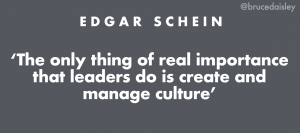
There’s a huge risk of splits in organisations – and thinking about fixing them is the biggest challenge of everyone right now.

